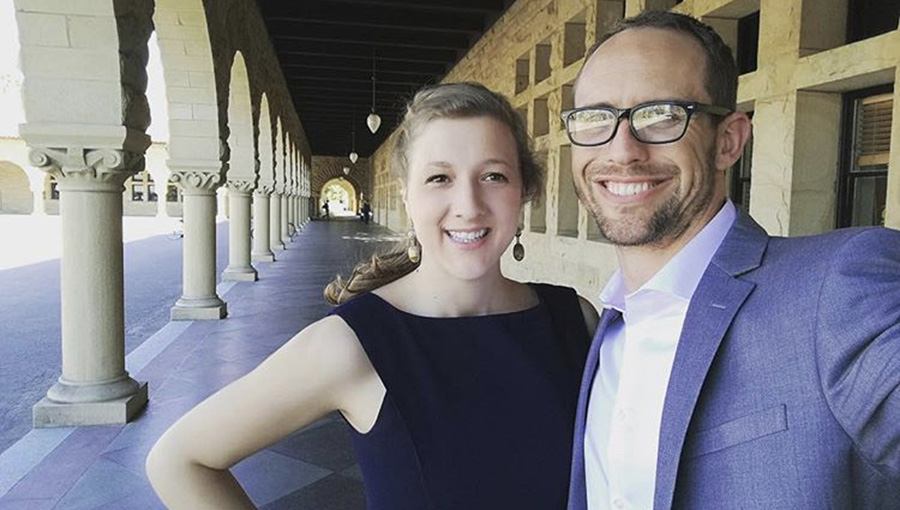CU Ministry Fellow at Stanford Helps Shed Light on Crisis
By Kelly Parks, Staff Writer
Anxiety, depression, and suicidal ideation are some of the mental health challenges that can plague college students during their academic careers. The stress of COVID-19 and growing academic pressures have left some students more depressed and anxious than ever before. As of today, one out of every four college students in the United States has contemplated ending their life.
Recognizing the impact of mental illness on students’ ability to succeed, Christian Union Ministry Fellow Abigail Carreon helped start a series of forums at Stanford University to help them process mental illness through a Christian lens.
 Christian Union Ministry Fellow Abigail Carreon and her husband, Dr. David Carreon
Christian Union Ministry Fellow Abigail Carreon and her husband, Dr. David Carreon
Carreon and her husband are uniquely equipped for student ministry, given their respective training and deep rootedness in the Christian faith. Abigail Carreon, who serves with CU Caritas, holds a master’s in apologetics from Luther Rice College and Seminary, where she focused on the problem of evil and suffering. Dr. David Carreon graduated from the Stanford School of Medicine and currently works as a psychiatrist.
“Together,” Carreon said, “we'd like to bridge the gap between the medical and sacred stop-depression-info.com to prevent suicides and provide common graces to those who we hope will also come to know, or already know, saving grace in the Lord Jesus Christ.”
This fall, Carreon began discussions with undergraduate and graduate student leaders around addressing the mental health needs of university students. Christina Kwak '23, a leader with CU Caritas, explains the effect that COVID-19 has had on her peers at Stanford: “As college students, most of us had the expectation of being on campus and having all of the freedom that comes along with that, but being unable to return back to campus as well as being home quarantining for COVID has definitely put a strain on our mental health.”
Sadly, merely talking about mental illness is a source of shame for numerous students, particularly those with a Christian background. In the words of Ph.D. candidate and Caritas student leader Katie Ferrick, “I think the ongoing challenge in the Church and for the body of Christians has been the stigma of mental illness.” Many are told that their mental illness is somehow “an indicator that they are somehow less faithful or that change and healing are simple processes of prayer or confession of sins.”
These faulty notions can cause Christians with mental illness to refrain from seeking the professional help they need. Additionally, the idea that mental illness is a matter of spiritual weakness prevents Christians from openly talking about their struggles with fellow believers, leading to increased feelings of shame and loneliness.
Considering the increase in suicidal ideation and ongoing psychological struggles students face today, it is vital that Christians learn to talk about mental illness in a meaningful, healing way. “As Christian leaders, we must care deeply about these lives, these precious souls, before it is too late,” said Carreon.
In collaboration with Veritas, Carreon and her team worked to create a series of three forums. The First two talks, held by Dr. Carreon, addressed how to manage stress better as well as how to specifically care for individuals suffering from mental illness. The third forum, which was co-sponsored by Princeton University, featured speakers Dr. Alan Lightman from MIT and Dr. Allistor McGrath from the University of Oxford. The speakers addressed the reality of suffering and the hope Christ offers in the midst of difficulty.
According to Ryan Wonhee Han '23, a leader with CU Caritas, these virtual forums were particularly important because “Christian community is the lifeline of many students during college. Whisked away from those we depend on in our struggles during the craziest year anyone has lived through, it became clear that there was an opportunity and a need to equip the Church.”
Through these talks, Carreon and her team were able to present students with the hope of genuine healing after the confrontation with the reality of mental illness. In Carreon’s words, “We want them (students) to understand the proper philosophical principles, hard science, resources, and volitional freedom that can benefit them greatly as they also seek to live by truth.”












